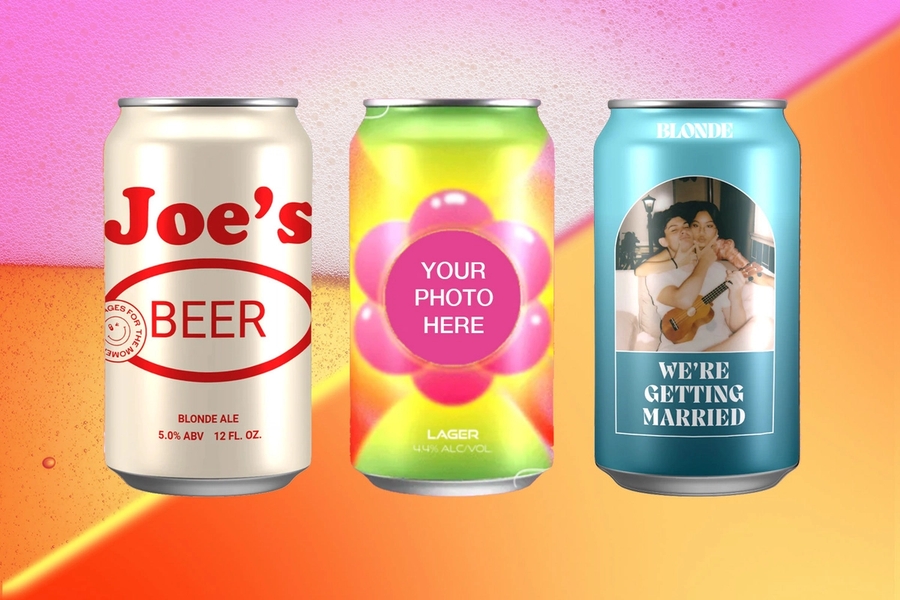You can kiss a bride. You can shower a bride with convection ovens and air fryers, you can pelt her with rice, and now you can drink the bride’s branded brew.
That’s thanks to Eliqs, a DTC custom-labeled beverage company with the aim of personalizing America’s brewskis.
Founded in 2019, the company (short for elixir, get it?) sprung from a graduate business-school thesis at UCLA and raised a $5.7 million seed round in August. Now the company is underway with a social ad push that began in September.
The company is targeting weddings, bachelor and bachelorette parties, basically any milestone worthy of a cold one, Eliqs’s co-founder Max Berg told Marketing Brew.
“How can we brand pretty much every product out there but can’t custom design your own beer?” Berg said. Or hard seltzer, canned wine, and sparkling or purified water, which Eliqs cans and ships nationwide.
Customers have two different options: They can customize a 12-pack using one of the company’s (Instagram-friendly) templates, adding text and photos to make it personal. These cost about $50.
Or, they can take it a step further with a fully custom design that involves a questionnaire, beverage selections, and a note for the designer. These orders can range from 36 to more than 500 cans, with prices starting at around $2.15 per can (plus a $95 design fee).
To sell and ship the hooch, Eliqs is licensed as a brewery and a winery, but the drinks come from other breweries or wineries and are bought wholesale. For example, a (fictitious) Morning Brew IPA could be sourced from the Slo Brewing Company in San Luis Obispo, California. A bride’s rosé might come from the Napa Wine Company in Napa, California. There are about 11 different options, all sourced in California.
More Stories
Why the benefits of samples could outweigh the costs for DTCs
For influencer marketing, Instagram isn’t the only show in town anymore
DTC advertisers, once reliant on Facebook and Instagram, are looking at different—and less expensive—marketing platforms
For Berg, what’s on the outside is the selling point. But the drinks have to be good enough for people to come back for more.
“If someone tries our beverages and it tastes like shit, they’re not going to buy from us again and they’re not going to recommend us to other people,” Berg said.
The margins on craft beer are worse than wine and better than water, Berg said. Pre-made cocktails have the best margins and are on the company’s roadmap once it gets its spirits license, he said.
Get marketing news you'll actually want to read
Marketing Brew informs marketing pros of the latest on brand strategy, social media, and ad tech via our weekday newsletter, virtual events, marketing conferences, and digital guides.
Before the pandemic, Eliqs was originally focused on creating drinks for larger gatherings, making inroads with wedding and event planners, but has since shifted toward smaller quantities as well.
The company has a few different revenue streams. It also runs a brand incubator, where Eliqs partners with influencers, entrepreneurs, and companies to create their own beverage brands. In May, it worked with the art collective MSCHF to make a “holy water-infused” hard seltzer. In January, it debuted a canned white wine called Dizzy (eight cans cost nearly $45) with influencer Tana Mongeau. In 2020, it released two Hocus Pocus canned wines with sales benefiting the New York Restoration Project.
There’s also the lesser known but, uh, incredibly lucrative world of promotional products (i.e., corporate swag), which was responsible for more than $22 billion in sales in 2021, according to Promotional Products Association International. (Of that $22 billion, food and beverage made up just 2.3% compared to apparel’s 27.6%.) Berg said B2B sales represent between 30% and 40% of the company’s revenue, and Eliqs attended the PPAI Expo in Las Vegas for the first time this year.
Appearing on a Shark Tank-style show from Karat Financial this summer, Berg said corporate business represented about 36% of the company’s revenue and DTC about 24%, with the brand incubator representing the rest. In 2021, the company posted revenue of about $860,000 and expects to double or triple that in 2022. Still, the company isn’t profitable yet.
After undergoing a rebrand and making its website friendlier to e-commerce, Eliqs recently started spending less than $1,000 a day advertising on Facebook and Instagram, targeting groups like bachelorette and bachelor parties, people with an interest in weddings, and people whose close friends have upcoming birthdays.
“We’re kind of doing the crawl, walk, run approach,” said Berg. When asked how he’d feel about working with a major distributor like AB InBev or Molson Coors, Berg said the company has hopes of becoming the “personalization platform for the beverage space,” said Berg.
“Honestly, we see a ton of people save the cans. They don’t want to drink them.”
